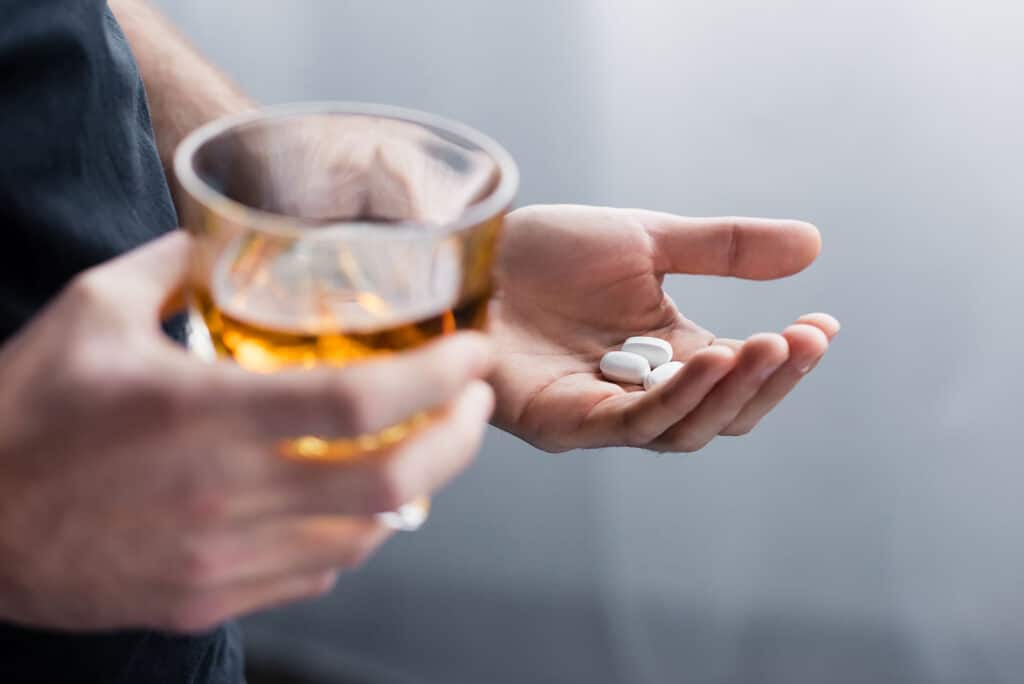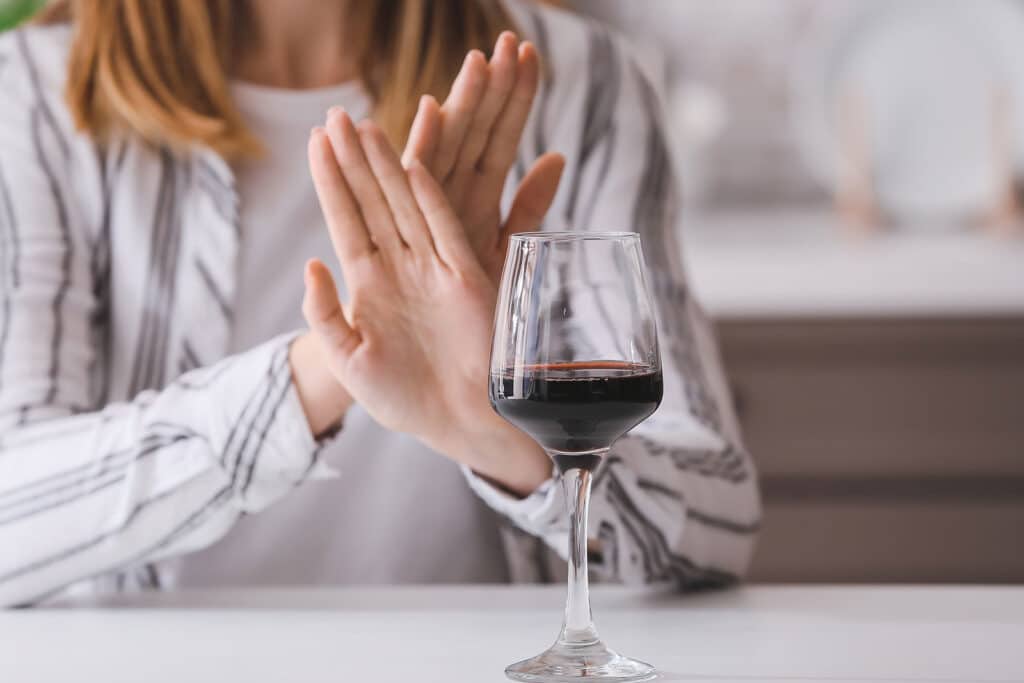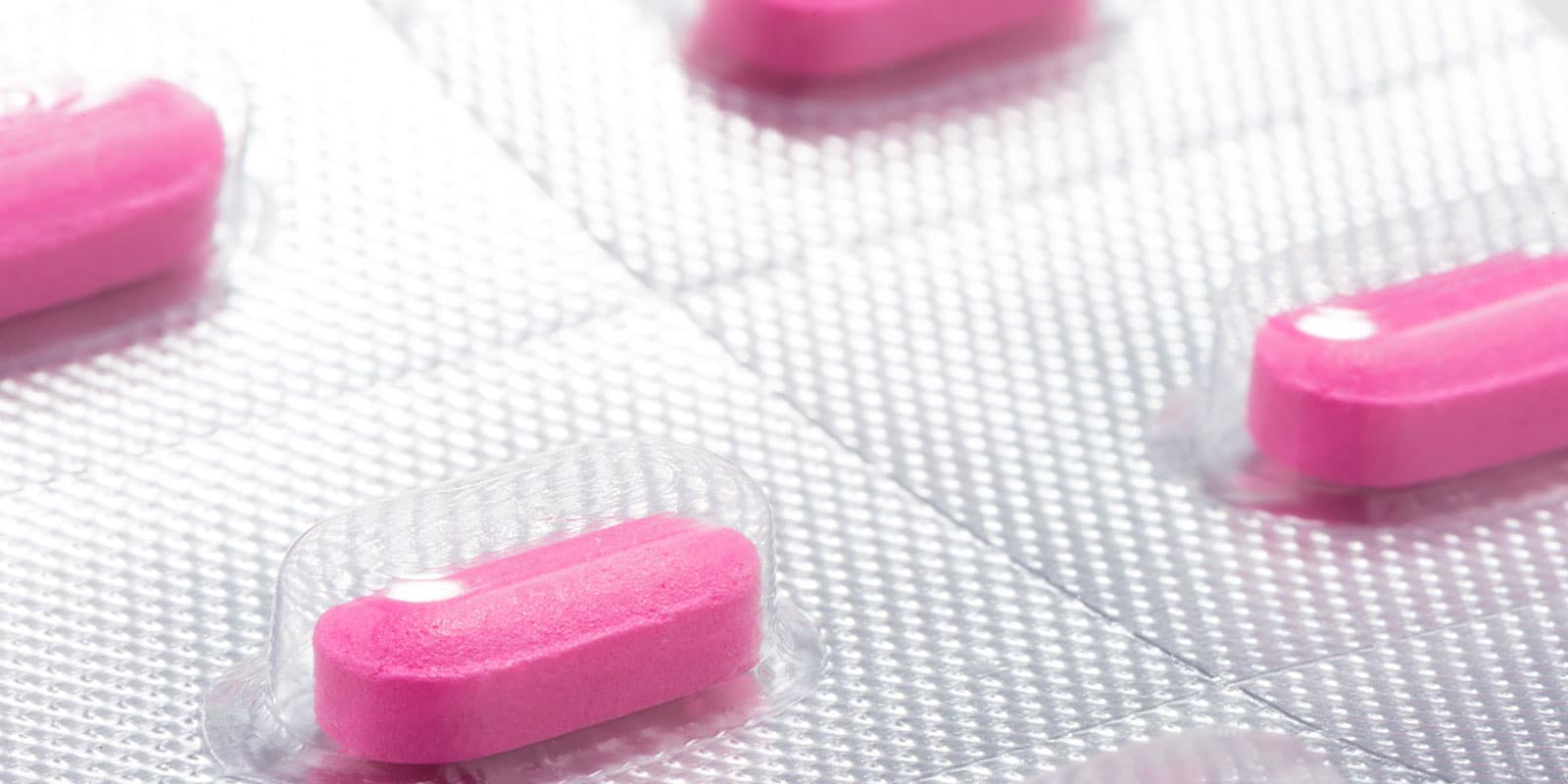Both Benadryl and alcohol are legal substances with a variety of uses, so you might end up in a situation where you are considering taking both. However, it is important to remember that even harmless medications can be dangerous when combined with other substances. You should always research carefully and consult with a doctor before taking two or more drugs at a time. Is it safe to mix Benadryl and alcohol? Explore this guide to see how these two substances interact.
Table of Contents
Understanding How Benadryl and Alcohol Affect Your Body
If you are thinking about mixing Benadryl and alcohol, it is important to understand how each substance will impact your health. Both of these substances can cause mental and physical effects.
Benadryl is the brand name for diphenhydramine which is a type of antihistamine. This medication is very popular for helping with allergic reactions. It works by reducing levels of the chemical histamine. Your body normally produces histamines as a response to allergy triggers, so Benadryl can prevent things like hives, sneezing, watery eyes, and runny noses. To lower histamine levels, Benadryl suppresses a variety of signals within your nervous system. As a central nervous system (CNS) depressant, Benadryl may cause drowsiness, dizziness, and impaired coordination.
Alcohol is another type of CNS depressant. When you consume alcohol, it blocks the communication pathways within your brain. This makes it harder for your brain to control essential tasks like speech, judgment, and memory. When taken in very high amounts, alcohol can also slow your heart and breath rates to dangerous levels. Alcohol also contains a lot of toxic byproducts that can damage the liver, kidneys, and other organs.
Is It Safe to Mix Benadryl and Alcohol?
Unlike some other drugs, Benadryl does not put stress on the liver. Therefore, combining Benadryl and alcohol is not likely to lead to liver failure right away. However, mixing Benadryl and alcohol can still be dangerous.
Since Benadryl and alcohol are both CNS depressants, it is a bad idea to combine them. Both of the drugs’ effects essentially stack with each other, resulting in a heavy dampening effect on the brain. You can end up dealing with breathing problems, a reduced heart rate, or other life-threatening symptoms.
Keep in mind that medications often behave unpredictably when combined. Taking Benadryl with alcohol can do far more than just make your drinks seem stronger. Due to the way they interact, the two substances essentially boost each other as well. A small amount of alcohol plus a small amount of Benadryl can be far more dangerous than just a heavy dose of alcohol or Benadryl by itself.

The Dangers of Combining Benadryl With Alcohol
Of course, the main risk of combining Benadryl and alcohol is the heightened overdose risk. Taking too much alcohol or too much Benadryl on its own can already be fatal, and when you combine the two, you greatly increase your chances of overdosing. Taking both substances at the same time strengthens dangerous side effects such as a slowed heart rate and decreased breathing rate. During an overdose of Benadryl and alcohol, you may have seizures or slip into a coma, and these health problems are potentially deadly.
Even if you don’t take enough Benadryl and alcohol to overdose, you can still have health problems. Combining these two drugs is associated with the following health problems.
Impaired Coordination
Mixing Benadryl and alcohol tends to intensify some of the most unpleasant side effects of Benadryl. People will typically have very poor coordination when combining the two substances. This can cause very dangerous situations if you drive or operate heavy machinery, and it also makes you more likely to suffer from accidents. Even very simple activities like walking upstairs after a Benadryl and a beer can result in dangerous mishaps.
Drowsiness and Unconsciousness
Benadryl is already so sedating that some people use it as a sleep aid, and mixing it with alcohol makes things even worse. This combination tends to make you intensely sleepy. You might nod off randomly, and you can even slip into unconsciousness. Keep in mind that you won’t get a good night’s sleep if you decide to take a Benadryl with a glass of wine. The combination tends to cause dizziness, stomach problems, and other physical discomforts that make it hard to sleep. It also disrupts your natural REM cycles, so you’ll wake up frequently and feel poorly rested in the morning.
Poor Judgment and Difficulty Processing Information
When you take Benadryl, the medication blocks the brain’s ability to process acetylcholine. This neurotransmitter is essential to processing information and remembering new things. At the same time, alcohol also impairs your ability to use judgment and logic, and it can temporarily block short-term memory. All of this combines to mean that people tend to behave bizarrely and unwisely while combining alcohol and Benadryl. You’re likely to be confused, make poor decisions, and struggle with any tasks that require mental comprehension.
Increased Dementia Risks
Benadryl and alcohol can continue to cause problems long after you quit using them. 2018 research has found that alcohol can damage the brain enough to cause dementia in seniors. Meanwhile, a study from 2015 also discovered that taking Benadryl daily also increases dementia. Instead of directly harming the brain as alcohol does, Benadryl seems to interfere with the long-term memory storage processes that usually happen during sleep. Ultimately, these two dementia-causing mechanisms combine to create drastically higher risks of dementia for people who misuse Benadryl and alcohol.

How Long Do You Need to Wait Between Benadryl and Alcohol?
If you want to manage your allergies but also want to drink alcohol, what should you do? To avoid any unfortunate mishaps, you need to wait for the alcohol or Benadryl to entirely leave your system before taking any other substance. There’s no hard or fast rule for how long you have to wait because it will depend on how much of the substance you took and how your metabolism works.
Benadryl’s half-life is between 3.4 hours to 9.2 hours, and its time to peak is 2 hours. This essentially means that Benadryl is strongest within 2 hours of you taking it, and it can take up to 9 hours for half of the drug to leave your system. To be safe, medical experts recommend waiting at least two days between taking large amounts of Benadryl and drinking alcohol.
Alcohol leaves your body a little quicker. Alcohol has a half-life of about four to five hours, and it usually takes your body a little over a day to clear alcohol out of your system. However, keep in mind that larger amounts can take your body longer to process. You may need to wait up to 36 hours between drinking alcohol and taking Benadryl.
Are You Considering Mixing Alcohol With Benadryl?
If you are in a situation where you are thinking about combining these two substances, it is a good time for some self-examination. In many cases, trying to mix Benadryl and alcohol can indicate a problematic relationship with alcohol.
Many people start wondering whether they can take alcohol with Benadryl because they are dealing with allergies but still want to enjoy the effects of alcohol. You will need to ask yourself whether you feel discomfort at the idea of not drinking while you take Benadryl. If you find yourself unable to pause your drinking, you may have a substance use disorder. This early warning sign is a hint you should stop and consider whether you have other substance use disorder symptoms such as drinking despite negative consequences or drinking more than you mean to.
It is also a cause for concern if you are considering taking Benadryl and alcohol because you want stronger mind-altering sensations. This is called polydrug abuse, and it is very problematic. Polydrug abuse occurs when a person is taking multiple drugs or types of drugs at the same time. People often engage in polydrug abuse because they are looking for a stronger high or a more intense buzz. When you have reached a stage where you are constantly seeking stronger sensations and are willing to harm your health to feel these sensations, you are exhibiting several types of substance use disorder symptoms.

We Provide Healthier Options
If you are concerned that you or a loved one may be dealing with alcoholism, it is important to seek professional help. An expert assessment can identify whether you are experiencing problematic drinking levels. Medical professionals will also be able to assist you with finding effective treatment options such as therapy or interventions.
At Long Island Treatment Center, we focus on helping our clients overcome drug and alcohol addiction. Our experienced team can safeguard your health and provide you with the tools you need to stay sober. We offer a variety of therapies, including partial hospitalization programs, medication-assisted treatment, and outpatient rehab. Contact the LITC team today to learn more.
Reference section
https://adf.org.au/reducing-risk/polydrug-use/
https://www.drugs.com/Benadryl.html
https://www.medicalnewstoday.com/articles/321078
https://www.ncbi.nlm.nih.gov/books/NBK526010/
https://www.healthline.com/health/how-long-does-alcohol-stay-in-your-system
FAQ
Can you drink alcohol while taking Benadryl?
How long after Benadryl Can I drink alcohol?
How long does Benadryl stay in your system?


